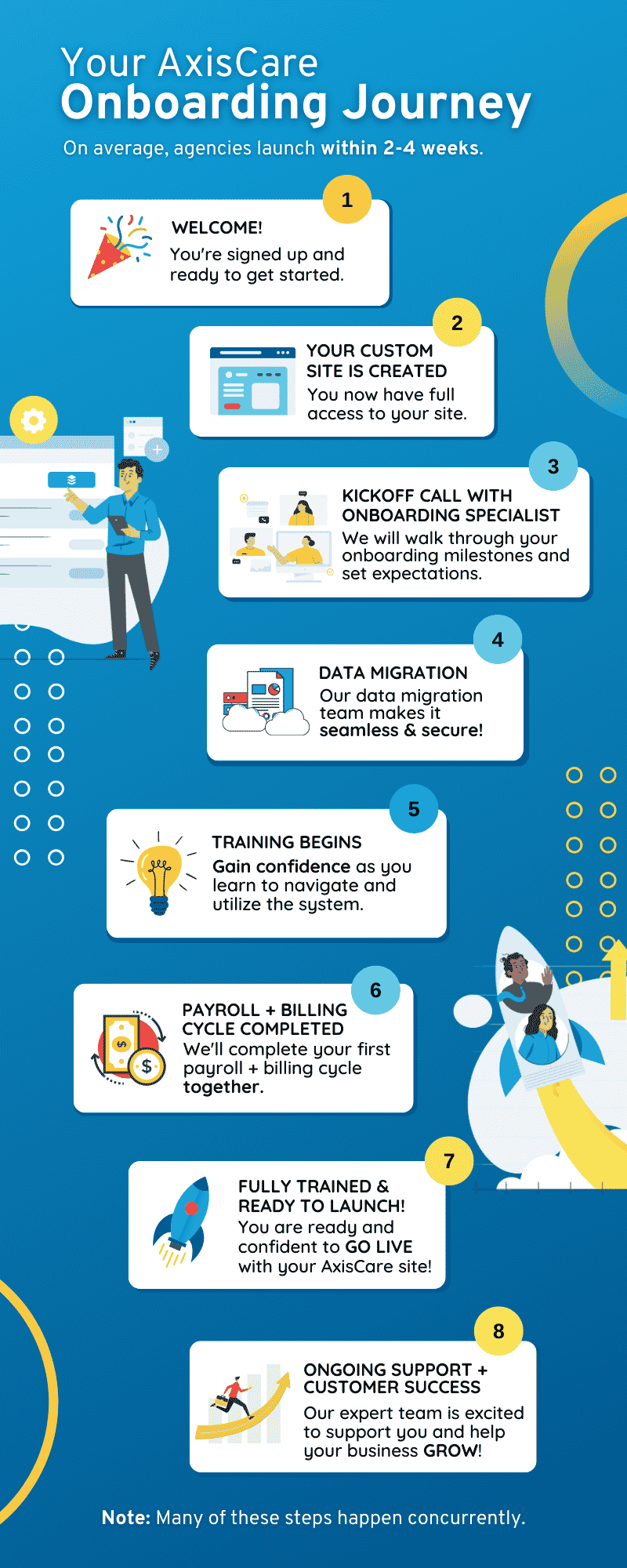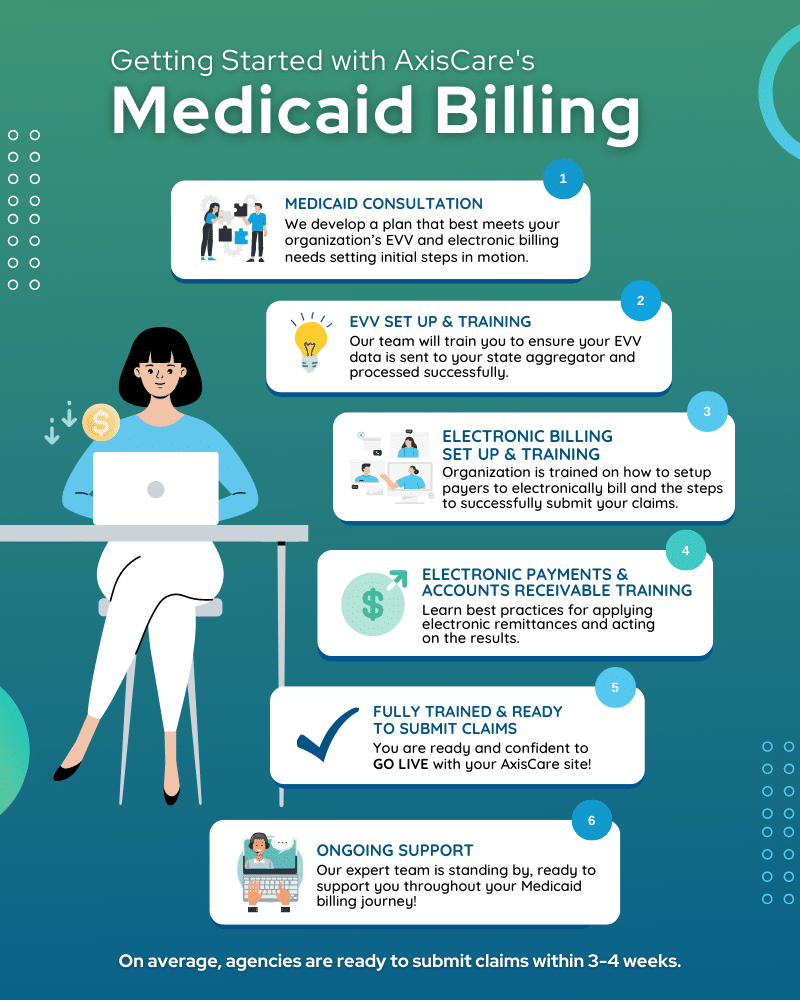In an industry that is gripped by issues of high employee turnover and burnout, finding, recruiting, and retaining a caregiver is no easy feat. Nearly 80% of caregivers will turn over within just 100 days of starting their new job, leaving agencies in an endless spiral of hiring, training, and unfortunately, attrition.
This cycle wastes a significant amount of resources, and in the event of a significant staffing shortage, agencies may actually need to start turning away clients.
Hiring the right people off the bat can help avoid these common pitfalls and build a trusted, reliable roster of caregivers. Here’s the key: finding a great fit isn’t just about someone’s qualifications and willingness to work. In this piece, we’ll cover the hiring process from every angle so you know exactly what to look out for throughout the interview process.
How to Identify the Best Caregiver Candidates
In a highly social and people-facing role such as caregiving, you will need to hire for the “whole package” – that means both experience and personality. Let’s take a look at some of the soft skills you should be looking for when engaging with a candidate.
Compassion
This is arguably one of the most important qualities of effective caregivers. Empathetic and compassionate staff will be able to more easily exhibit kindness towards clients, as they will sincerely feel and understand what they are going through.
Patience
Sometimes, patients move and process things slowly. Sometimes, they take a while to express themselves. They may become frustrated, upset, or angry. No matter the case, caregivers should have a deep well of patience for both clients and their families as they navigate challenging situations.
Honesty
Caregivers should always show up both physically and emotionally for their patients. Honesty means leading with a transparent attitude and performing the required tasks using sincere and educational language.
Sensitivity
Different patients will be comfortable with different forms of intervention based on their values and personal experiences. The right caregiver will make sure to take these things into account and go to lengths to confirm that clients are comfortable throughout each appointment.
Certifications & Training
While caregivers employed by non-medical home care agencies are not typically required to complete any certifications or training, they can certainly go a long way towards singling out candidates who are especially experienced or committed to the role. Here are a few standard ones to look out for while interviewing.
Home Health Aide (HHA) certification
This program trains participants on foundational home care practices like personal care, mobility assistance, personal hygiene, and basic health monitoring. It is mandated for caregivers who work at an agency funded by Medicare or Medicaid and optional for everyone else.
Personal Care Assistant (PCA) training
While HHA also incorporates elements of medical care, PCA training is specifically designed for non-medical intervention and assistance with ADLs, or “activities of daily living.” This includes grooming, bathing, dressing, meal preparation, housekeeping, and companionship.
Dementia & Alzheimer’s care
Some specialized programs instruct caregivers on how to interact with patients with cognitive impairments. They are taught how to manage challenging behaviors, adopt effective communication strategies, and understand the different stages of dementia.
CPR & First Aid
Many non-medical home care agencies require their caregivers to maintain up-to-date certifications in basic CPR and first aid. This ensures they will be able to handle emergency situations effectively while waiting for a paramedic to arrive.
Background Checks & Credentials Verification
Since caregivers work in clients’ homes and often with vulnerable individuals, agencies must do everything in their power to ensure their trustworthiness and professionalism. If a candidate has any criminal history, a background check will bring it to light, immediately disqualifying them from the hiring process.
Running these checks not only safeguards clients from potential harm or abuse but also gives the green light for agencies, fellow caregivers, and families to trust them. Validating candidates’ credentials and employment history further serves to verify their alignment with state regulations and industry standards, helping agencies protect their reputations, reduce liability, and create a safer caregiving environment.
Best Practices in the Caregiver Hiring Process
The following tips are a great way to round out the efficiency, effectiveness, and overall quality of your hiring process beyond what we discussed above.
Implement Structured Interviews
Comparing every candidate against the same interview rubric will allow the truly outstanding ones to shine. Establishing a repeatable structure with consistent questions and evaluation criteria is the best way to assess applicants in a fair and thorough manner while reducing discrepancies and biases between interviewers.
Utilize Behavioral Assessments
Unlike traditional interview questions, behavioral assessments focus on how candidates have handled specific situations in the past or how they would respond to future challenges while on the job. This method provides deeper insights into candidates’ problem-solving skills and adaptability under pressure.
For example, you may choose to float scenarios like managing a difficult client with dementia, dealing with a medical emergency, or handling a stressful family situation. Applicants’ responses will help reveal important traits like patience and resilience, painting a more comprehensive picture of their strengths and weaknesses beyond their CV.
Integrate Home Care Software
Home care software helps agencies automate their hiring process, adding structure and standardization to their approach. AxisCare, for example, integrates with hiring tools that make tracking applications, scheduling interviews, verifying qualifications, and managing documentation a breeze.
Handling your hiring and retention using the same software as your billing, shift scheduling, and business intelligence reduces administrative burden and the need to toggle between platforms. In the event that a candidate moves from interviewee to staff member, it can also make for seamless information transfer.
Streamline Your Caregiver Hiring Process With AxisCare
The hiring process demands a lot of home care teams. But when it’s done right, all of that work will pay off and will actually reduce friction in the long run. Request a live demo with AxisCare to learn more about how we can improve your ability to attract and retain qualified staff for the long haul.









